Accessing quality healthcare is a troubling reality for millions of Indians. For many poor families and senior citizens, navigating the healthcare system is not just a challenge—it is a daily battle for dignity and survival. Imagine the frustration of parents unable to afford life-saving treatment for their children or an elderly person denied care due to lack of resources.
These systematic inequities have plagued India’s healthcare system for decades.
Despite some progress since independence, the situation remains dire for those at margins. As per report of Niti Aayog, every year, 7% of India’s population is pushed deeper into poverty by medical expenses they can’t afford.
For people living in rural areas and urban slums, accessing healthcare feels like an unattainable dream. It is a harsh reality faced by millions- a reality which demands meaningful change.
Recognizing this, the government of India has introduced the Ayushman Bharat Pradhan Mantri Jan Arogya Yojna (PM-JAY) and the Ayushman Bharat Health Account (ABHA) card.
The program brings benefit to the underprivileged class those who need it the most: the poor, the elderly, and the vulnerable.
The schemes not just promise financial protection but also the hope of a healthcare system that improves quality of life and treats every individual with fairness and respect.
The article explains how these initiatives help ease the financial burden of healthcare for those who need it most and empower underprivileged, elderly, and vulnerable populations in India to access quality care with dignity.
Take a moment to explore all the crucial details about the Ayushman Bharat Pradhan Mantri Jan Arogya Yojana (PM-JAY) and the Ayushman Bharat Health Account (ABHA) card, including how to apply, eligibility criteria, benefits offered by these schemes.
The need for the PM-JAY scheme and the ABHA card
Going to the hospital can be expensive. Imagine the costs for hospital beds, medical exams, tests, consultations, and medicines, which can quickly add up. Without health coverage, these expenses can create a financial burden. For the 80 million Indians living below the poverty line, healthcare often takes a backseat to more immediate needs, like food and shelter.
On top of the cost, managing medical records can also be a challenge. When visiting a doctor, you’re often asked about your medical history. Some details are easy to remember, but others can be tricky, especially for older citizens with a long medical history.
To help with these issues, the government of India introduced the Ayushman Bharat initiative in 2018. The initiative includes the ABHA card and the PM-JAY. The PM-JAY focuses on providing health insurance for senior citizens and low-income families, while the ABHA card is all about digitizing your health records, making it easier to manage and access them anytime you need.
What is PM-JAY scheme and PM-JAY card?
The Pradhan Mantri Jan Arogya Yojana (PM-JAY) is world’s largest health insurance scheme launched by the Government of India. The scheme is aimed at providing financial coverage for secondary and tertiary healthcare services at any hospital across the country.
Initially targeting the poorest 40% of India's population, the scheme has since expanded to include all senior citizens aged 70 and above, regardless of their financial situation.
The PM-JAY card provides free medical coverage of up to 5 Lakh per year per family.
Since its launch in 2018, the PM-JAY program has delivered free medical benefits worth over ₹1 lakh crore to individuals nationwide.
Benefits of the PM-JAY card:
- Covers up to ₹5 lakh per family per year for medication, surgeries, and critical operations.
- Any family member, including women, girl children, and senior citizens, can use the benefits.
- Accepted at more than 10,000 government and private hospitals across the country. Check the’ Find nearest empaneled Hospital’ to locate nearby ABHA-card-accepting hospital across India.
- Coverage for over 1900 medical procedures, including diseases, diagnostics, lab tests, consultations, medicines, and supplies. Check ‘Find nearest empaneled Hospital’ to find list of eligible hospitals and the medical procedures covered under the scheme.
- The card is accepted nationwide.
- 3 days of pre-hospitalization and 15 days of post-hospitalization treatments included.
- Access to alternative medicine systems like Ayurveda, Unani, Yoga, Siddha, and Homoeopathy.
Today more than 50 Crore Indians have simplified their lives and saved money by registering for an ABHA card. If you wish to register, go through the eligibility criteria and step-by-step guide given below.
Eligibility criteria for the PM-JAY Card:
The PM-JAY card was initially designed to provide medical insurance to economically weaker sections, but now also includes medical coverage to every senior citizen above the age of 70 irrespective of their financial background.
Other than this, the eligibility criteria for the PM-JAY are different for rural and urban areas.
For Rural areas, Beneficiaries are:
- All senior citizens above the age of 70 are eligible.
- Families lacking a place to live.
- Households belonging to the Scheduled Caste (SC) or Scheduled Tribe (ST) communities.
- Tribal groups susceptible to harm.
- Individuals who beg for money or rely on charitable donations for their livelihood.
- Families lacking individuals aged 16 to 59 years old.
- Families with no adult man aged 16 to 59.
- Families with one disabled member and no adults without disabilities.
- Households without land, who make a major portion of their money by doing temporary physical work
- Families residing in single-room house made of mud walls and thatched roofs.
For Urban areas, Beneficiaries are:
- All senior citizens above the age of 70.
- Waste collectors
- Household workers
- Beggars.
- Laundry man, security guard, technician, mechanic, plumber, builder.
- Cleaner, sanitation worker, gardener.
- Cobblers, market vendors, and other individuals offering services outdoors
- Tailors, craftsmen, skilled artisans.
- Laborers, welders, painters, porters, and other manual laborers.
- Peons, shop workers, waiters, caretakers.
- Bus drivers, public transportation employees, rickshaw pullers.
To check the eligibility of your family for the PM-JAY card, follow the given steps:
1) Click here. The link will lead you to the official portal of national health authority. Following page should appear.
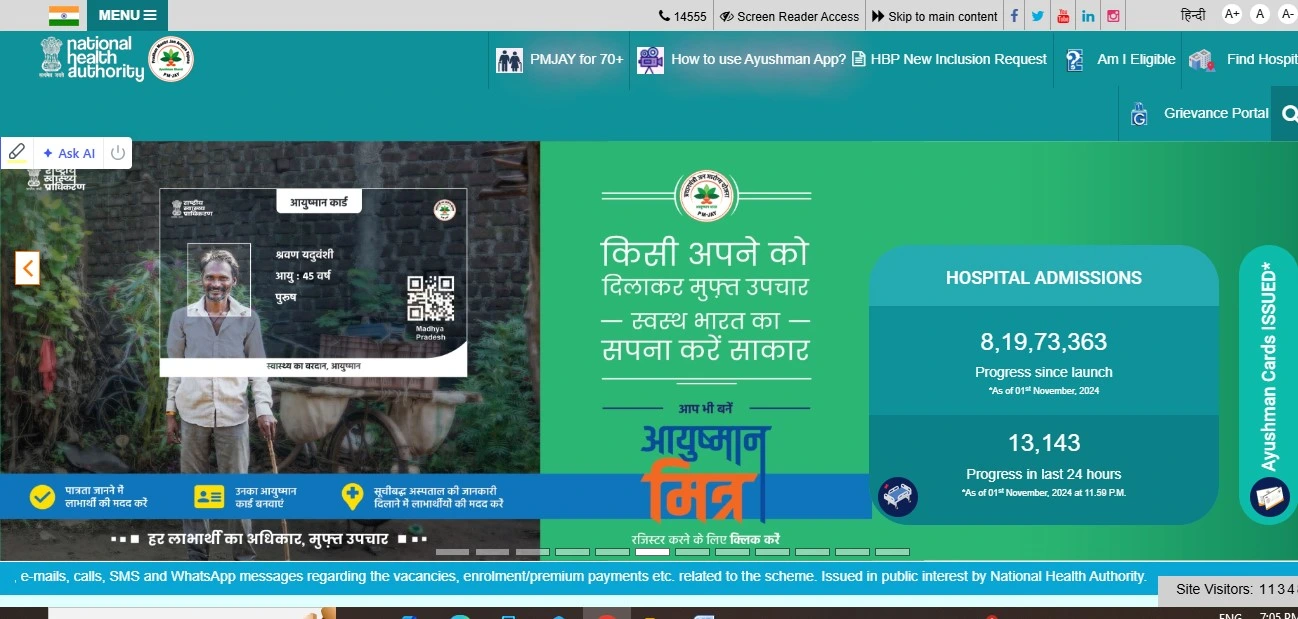
2) Click on ‘Am I Eligible’ icon on the top right corner.
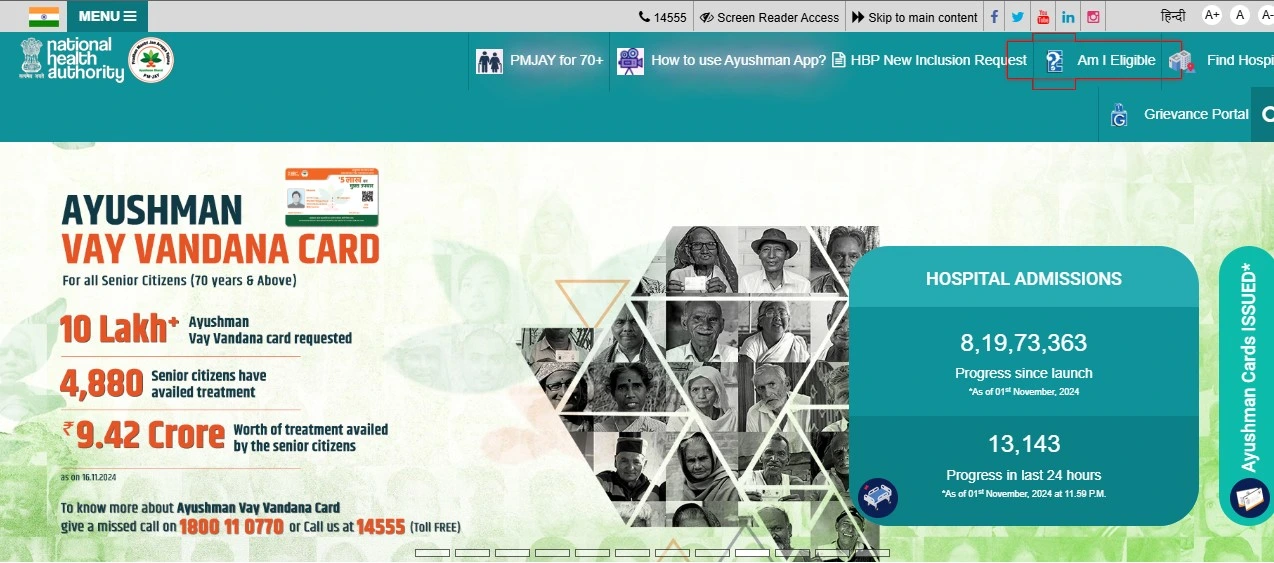
3) Following page should appear. Enter the mobile number and captcha. In the authentication mode, choose mobile OTP. Enter the received OTP and reconfirm captcha. Click on login.
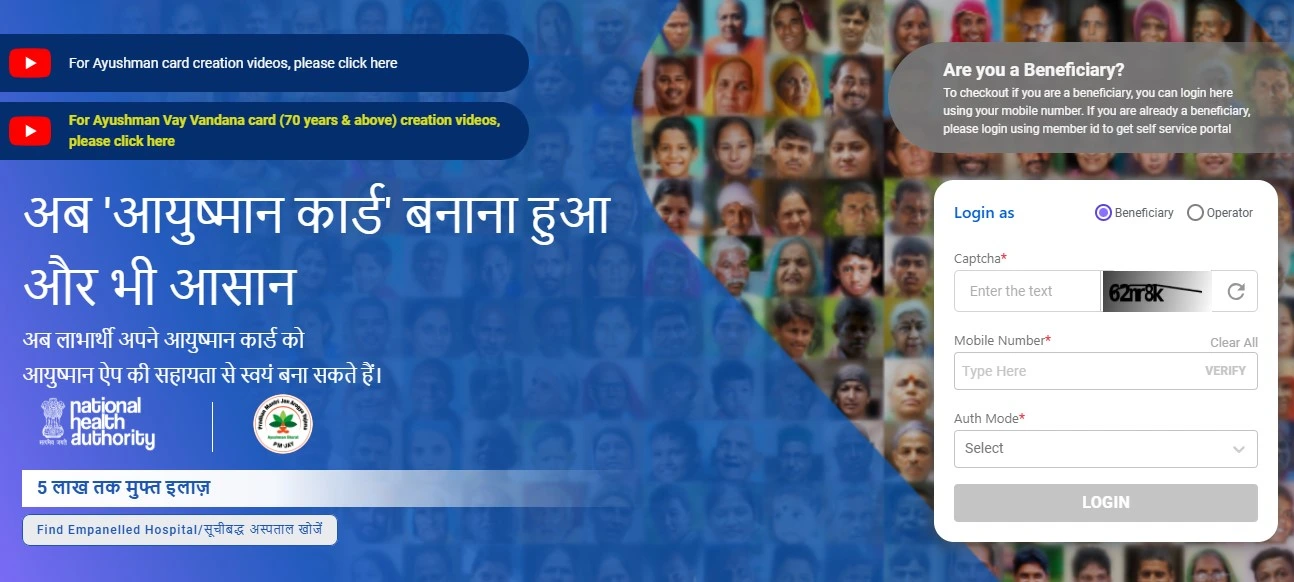
4) Following page should appear. Enter your state. In sub-scheme, choose PMJAY. Choose your district and in ‘search by filter’, choose your desired option and fill details.
Verify captcha and click on the search sign.
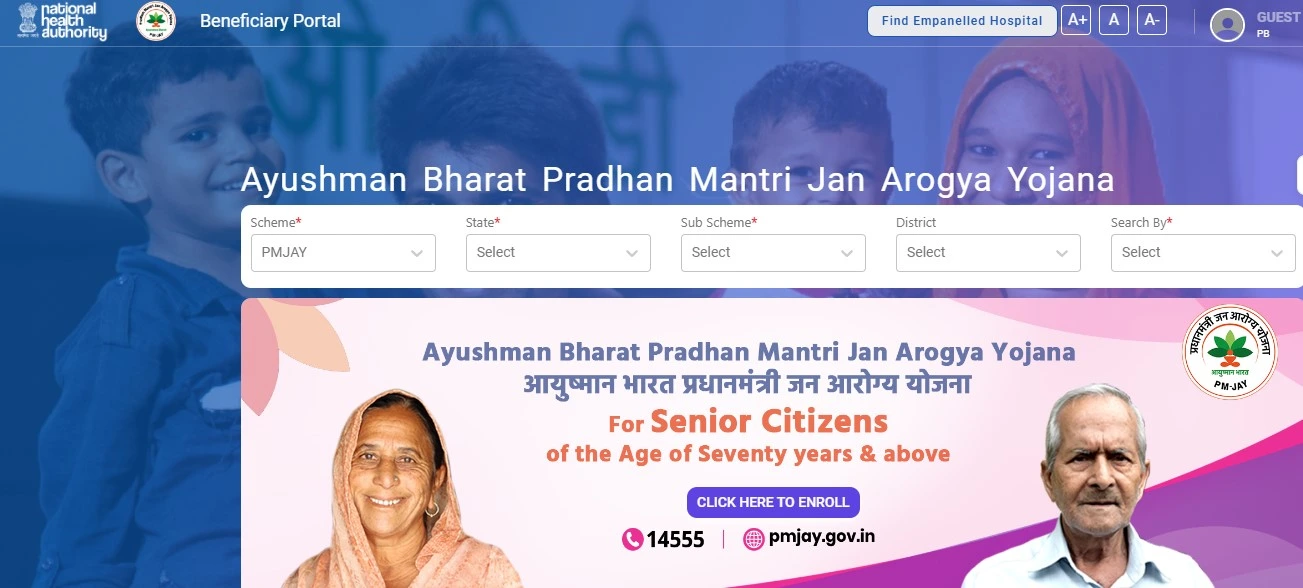
5) If you are a beneficiary, then you will see an Ayushman card list. Click on the download icon.
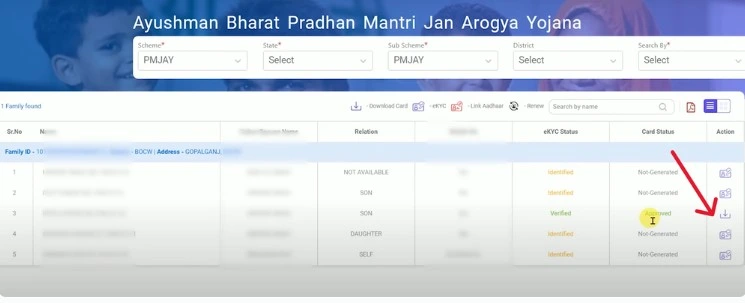
If you are not eligible, then ‘No Beneficiaries found in given Search Criteria’ will appear on the screen.
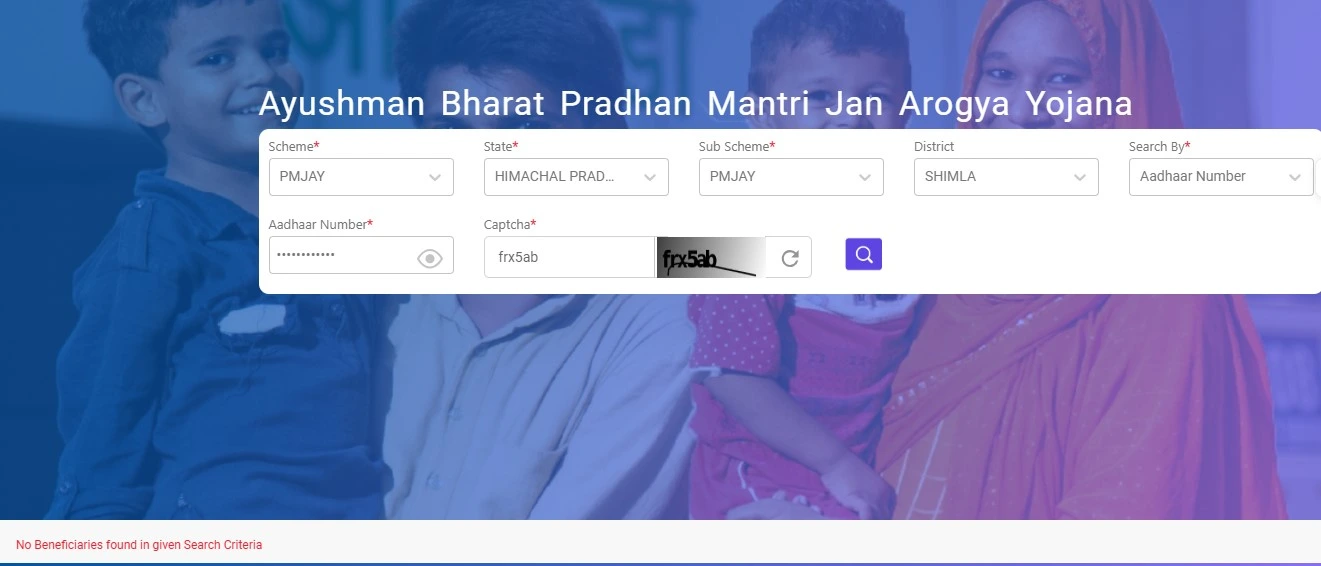
How to check your eligibility offline?
Checking your eligibility online can sometimes be tricky, but don’t worry – you can also check it offline at your nearest empanelled hospital or common service centre. Just follow this simple step-by-step guide, and you’ll be able to easily check your eligibility for the PM-JAY card:
- After your treatment is completed, show your PM-JAY card to the Ayushman operator at the hospital's billing counter. The operator will check for your UID on the card.
- If you don’t have your PM-JAY card at the time of treatment, don’t stress! You can still verify your eligibility by authenticating with your UID.
- When authenticating with your UID, you’ll receive an OTP on your registered mobile number.
- After you share the OTP with the operator, they will check your eligibility through the PM-JAY server. If you’re eligible, your PM-JAY card will be issued, and the treatment cost will be covered from your available balance. However, if you’re not eligible for the PM-JAY card, you’ll need to bear the full cost of your treatment.
Who is NOT eligible for the PM-JAY Card?
- Individual owning a 2-wheeler,4-wheeler.
- Owning a agricultural machine.
- If the household have a refrigerator and landline phone.
- Agricultural land of more than 5 acres.
- Government employees.
- Member of a family earning more than Rs 10000/- pm.
- Individual paying income tax.
- Living in a pucca house.
How to Apply for the PM-JAY Card?
Follow the step-by-step guide to apply for the PM-JAY card given below:
Online process:
1) Go to the official PM-JAY beneficiary website.
2) On the homepage, look for the option to search for existing beneficiaries.
3) You can use details like your state, the PM-JAY scheme name, ID, Family ID, location, or
Aadhaar number to search. It's easiest to use your Aadhaar number as it simplifies the process.
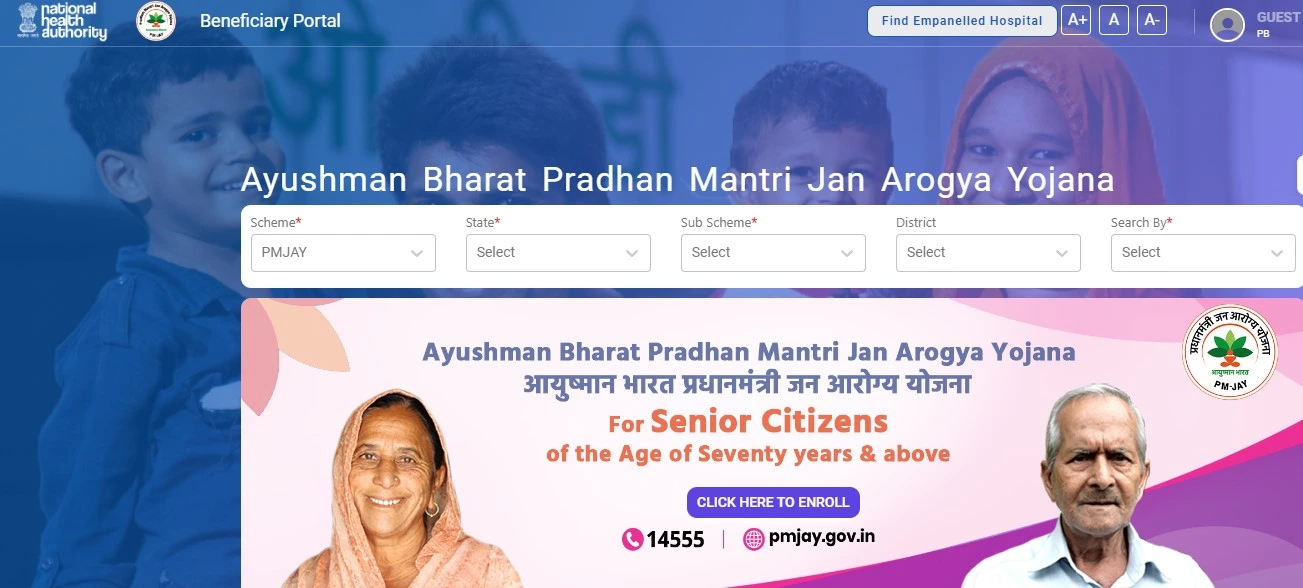
3) Input your Aadhaar number into the designated field and click the search button to proceed.
4) A page will open displaying the status and details of the Ayushman cards linked with your Aadhaar number. Confirm your details to ensure you are eligible for the scheme.
5) If your KYC is complete and the card is approved, you will see a download option next to your name.
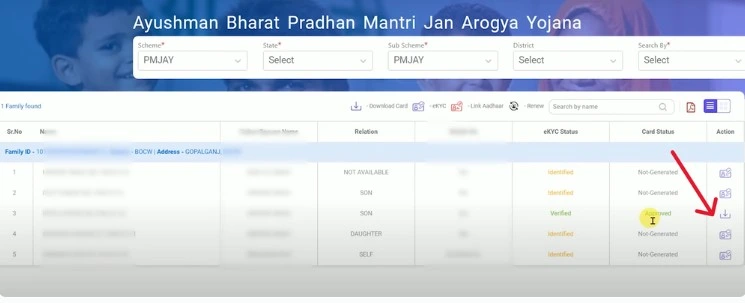
6) You will need to authenticate your identity to download the PM-JAY Golden Card. Choose Aadhaar as your authentication method and verify using the OTP sent to your registered mobile number.
7) After successful verification, the card will be available for download in PDF format.
Click 'download' to save your Ayushman Bharat Card to your device for printing.
Offline Process:
If you'd rather apply offline or face any issues online, you can easily visit a Common Service Center (CSC) nearby:
- Bring your Aadhaar card and any required documents for verification.
- The helpful CSC staff will guide you through the application process, assist with data entry, and issue your PM-JAY card.
Find Nearest Empaneled Hospital:
The benefits of both the PM-JAY scheme and the ABHA scheme can be redeemed at only government approved hospitals, called empanelled hospitals.
Here’s how you can easily find an empanelled hospital near you:
1) Head to the PM-JAY official website or open the Ayushman Bharat app on your phone.
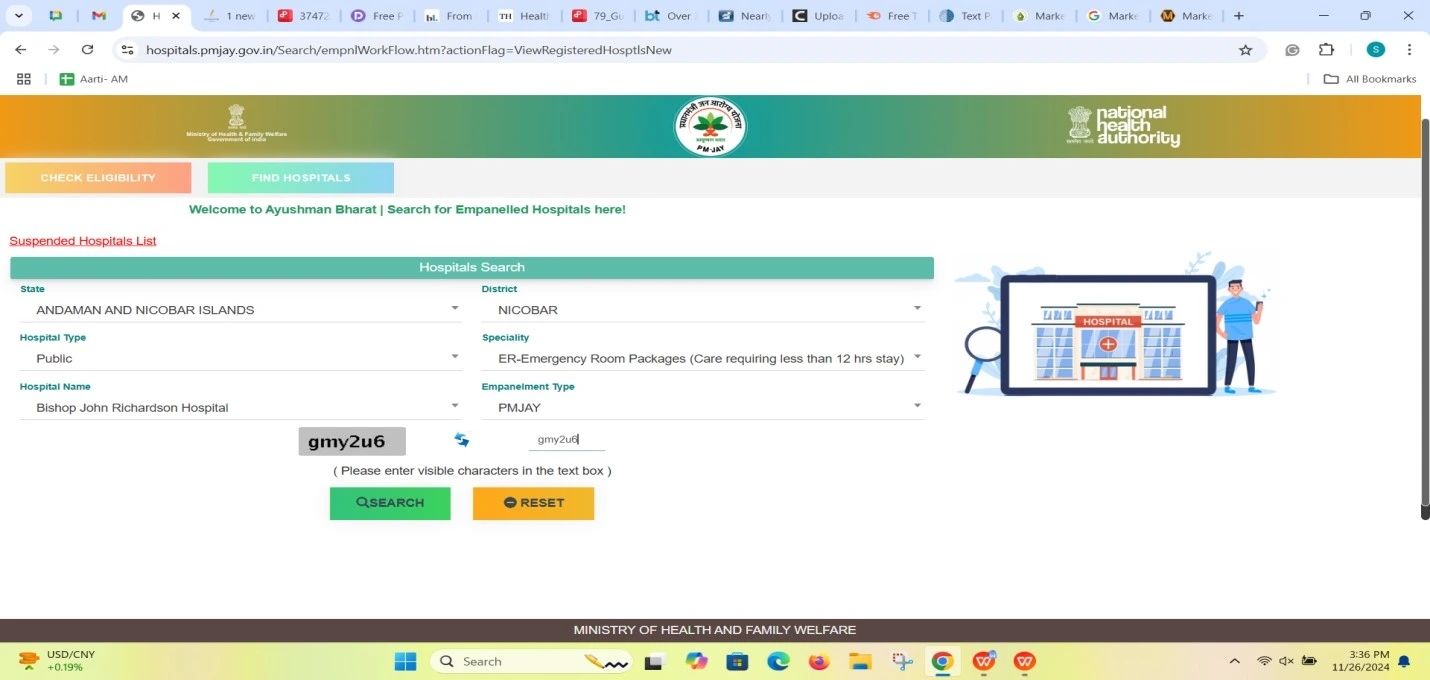
2.) To find your desired hospital enter the state and district in the provided space.
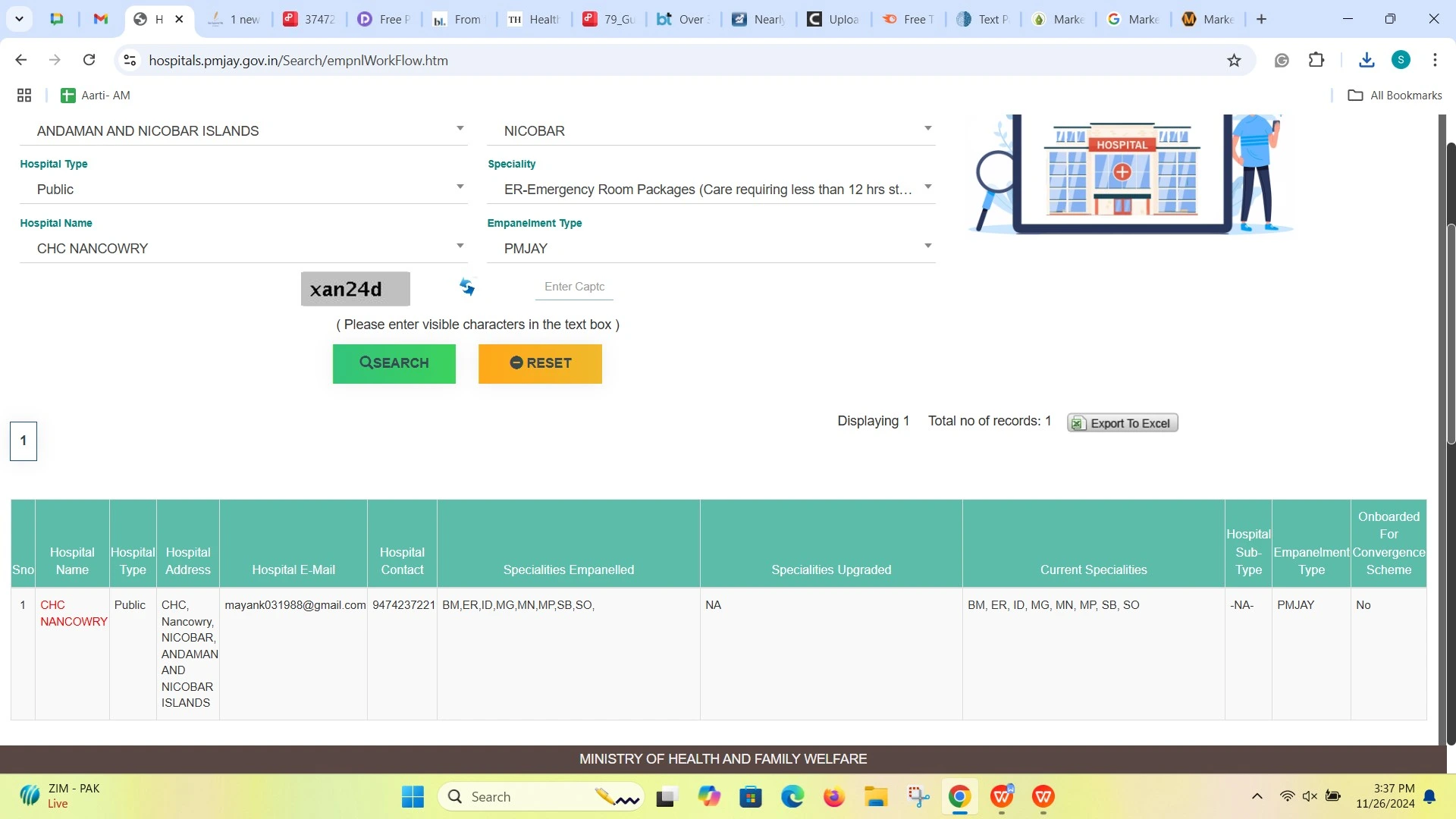
3.) Fill the text in the ‘Captcha’ code and click on search.
4.) The list of all the empanelled hospitals in your chosen district appears on the screen. Scroll down to find most suitable hospital. The type of medical services and mobile number of the hospital are also included in the list. And that’s it! Now you know where to go for hassle-free treatment under PM-JAY.
How the Payment is made on Your Behalf?
The PMJAY scheme is completely cashless and paperless at any of the listed hospitals. You do not have to pay anything for hospital costs if you are benefiting from it.
- Each person enrolled in the scheme has a credit limit of Rs 5 lakh loaded onto their PM-JAY card. Please note that the money is not directly credited to your bank account; rather, payment is made from the government to the hospital directly through your PM-JAY card.
- After your treatment is done, all you need to do is show your PM-JAY card to the Ayushman operator at the hospital desk.
- The operator will then check your card and verify your information through their server.
- Once verified, the operator will send an OTP to your registered mobile number.
- After you share the OTP with the operator, they will check your available balance and the cost of your treatment.
- If the available balance in your card is enough to cover the treatment cost, the amount will automatically be deducted from the balance.
- If the treatment cost exceeds the available balance, you will need to pay the remaining amount.
- Once the bill is settled, the operator will send you all the details of your medical bills, and after that, you will be allowed to discharge from the hospital.
If at the time of hospitalization, you do not have your PM-JAY card or UID with you, you will need to show your government-authenticated ID proof (such as a Ration card, Voter ID, etc.). You will also be advised to get your UID or PM-JAY card within a specified period, or you may have to bear the full cost of the treatment.
Scams Related to PMJAY: What You Should Know and How to Stay Protected
The PM-JAY card, designed to provide healthcare support to economically disadvantaged groups, has been exploited by some individuals. Scammers including beneficiaries, payers, and the healthcare providers, have made fake ABHA cards to fool the system. According to report, 3000 cases of fraud and scams with amount of Rs 4.6Cr are reported to NHA. During inspection, more than 9000 hospitals were suspended and INR 2.29 Crore were recovered after the scam.
To ensure you receive the full benefits of your PM-JAY card, please verify that the hospital is listed among the empaneled hospitals. Only visit hospitals on the approved list to avoid any potential scams. To check the list of de-empaneled hospitals, click here.
Select your desired state and district, enter captcha and see the list of all the suspended hospitals in your district.
What is an ABHA?
ABHA scheme is a flagship scheme of the government of India to maintain digital medical records of patients and the ABHA Card is the gateway to creating a digital identity of patients. It contains a unique 14-digit unique ID called ABHA ID. The entire medical history, consultation details, and prescriptions of card holder are included in the ABHA ID. The patient no longer needs to remember all the details. Doctors can access all the healthcare records of the patients.
Eligibility criteria for registering for an ABHA Card
- All Indian citizens are eligible.
- Identity Proof: Aadhaar Card or Driver’s License (Government-recognized).
- Address Proof: Required.
- Bank Account: Must be linked to Aadhaar card.
- Domicile Certificate: Required.
- Caste Certificate: Needed for documentation, though the PMJAY scheme is open to all categories.
How to Apply for the ABHA ID Card?
Below is the step by step process to apply for the ABHA Card:
1) Click here to go to the official website of National Health Authority to register for ABHA.
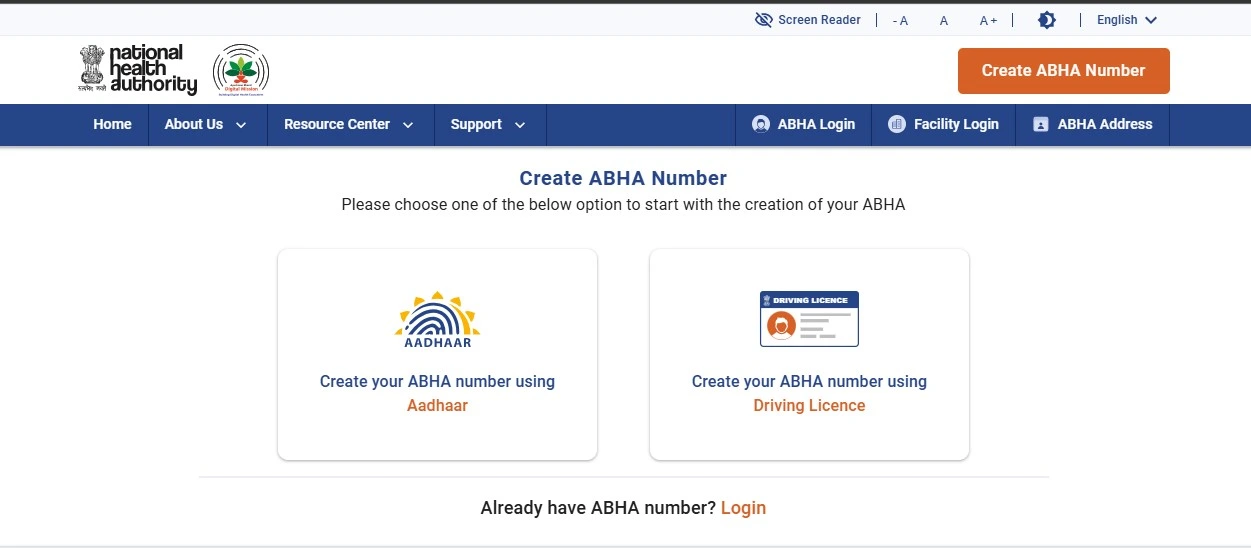
2) Choose either "Create your ABHA using Aadhaar" or "Create your ABHA using Driving License" to proceed, based on your convenience.
3) If proceeding with Aadhaar, first enter the number in the designated box and then fill in the captcha displayed in the image. It is a verification process to ensure the login is performed by a human and not a robot.
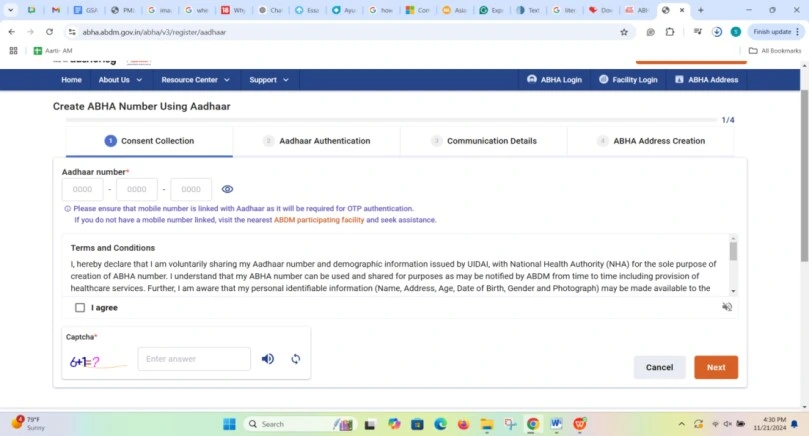
Click on ‘I agree” and click next.
4) If you are applying through driving license, choose create your ABHA using driving license. Enter your driver’s license number for verification.
5) Now you will get the OTP on your registered phone number. Fill the boxes and click on next.
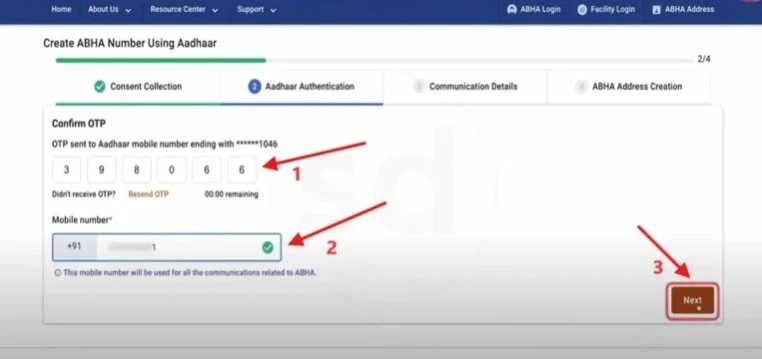
6) Next it will ask for your email address, make sure that you write the correct email address.
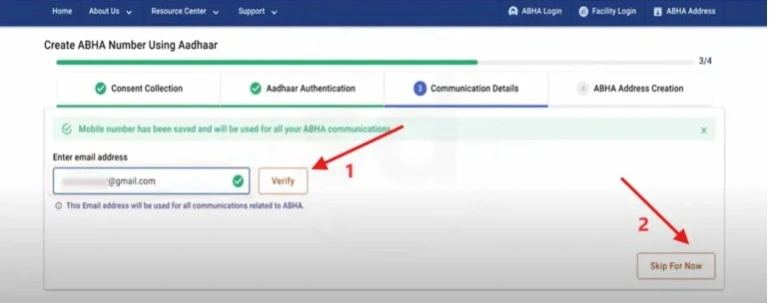
Click on verify and then proceed, you can also skip this part by clicking on ‘Skip for now’ but later on you will be required to give the mail address for verification purpose.
7) Now create your own unique ABHA address by following the given instructions.
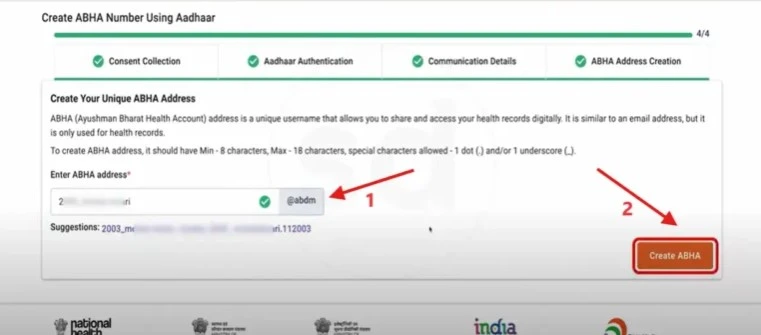
When done, click on ‘Create ABHA’.
8) Your ABHA card is created. You can download your ABHA Card from the ‘download ABHA card’ option displayed at the top of your card.
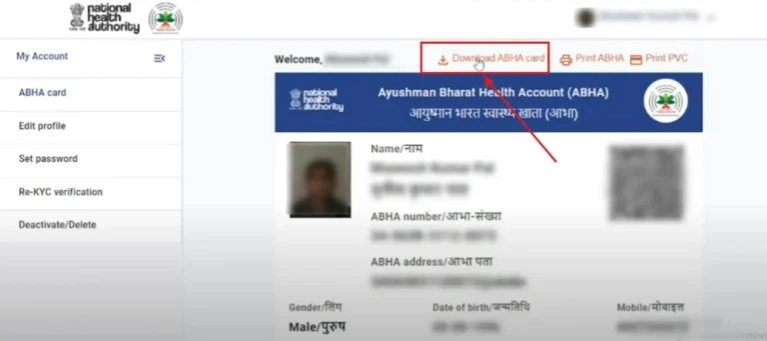
State-wise Empanelled Hospitals and Beneficiary Distribution:
The data on empaneled hospitals and beneficiaries highlights key trends and disparities in the PM-JAY scheme's implementation across states. Refer Table.
Table: State-wise empanelled hospitals and Beneficiary Distribution
| State | Empanelled Hospitals (Number) | Beneficiaries (Number) | Beneficiaries per hospital (Number) |
| Andhra Pradesh | 1166 | 1106765 | 949 |
| Arunachal Pradesh | 2 | 1805 | 902 |
| Assam | 192 | 194896 | 1015 |
| Bihar | 316 | 248164 | 785 |
| Chandigarh | 23 | 8188 | 356 |
| Delhi | 68 | 1276767 | 18776 |
| Goa | 14 | 10200 | 728 |
| Gujarat | 807 | 2193841 | 2718 |
| Haryana | 468 | 220031 | 470 |
| Himachal Pradesh | 106 | 80179 | 756 |
| Jammu and Kashmir* | 70 | 108396 | 1548 |
| Jharkhand | 569 | 760076 | 1336 |
| Karnataka | 790 | 1205647 | 1526 |
| Kerala | 579 | 1780470 | 3075 |
| Madhya Pradesh | 490 | 633114 | 1292 |
| Maharashtra | 686 | 419069 | 611 |
| Manipur | 15 | 27537 | 1836 |
| Meghalaya | 17 | 225552 | 13268 |
| Mizoram | 13 | 49543 | 3811 |
| Nagaland | 14 | 16893 | 1207 |
| Tripura | 2 | 83183 | 41591 |
| Punjab | 689 | 549205 | 797 |
| Rajasthan | 178 | 1299504 | 7300 |
| Sikkim | 1 | 2864 | 2864 |
| Tamil Nadu | 2222 | 2456291 | 1105 |
| Telangana** | 331 | - | - |
| Uttar Pradesh | 1860 | 595980 | 320 |
| Uttrakhand | 121 | 251197 | 2076 |
| West Bengal | 7 | 17636 | 2519 |
Table data source:
https://pib.gov.in/PressReleaseIframePage.aspx?PRID=1696433
https://www.hexahealth.com/hospitals/insurance/ayushman-bharat-hospitals-list-andhra-pradesh
Data limitations:
*The data for Jammu and Kashmir is inclusive of Ladakh region. No separate data is provided for Ladakh region.
**marked as Nil because the count of beneficiaries is not available.
Key Observations from the data:
- Disparities in Hospital Availability: States like Andhra Pradesh and Tamil Nadu have the highest number of empaneled hospitals, enabling better access to healthcare. Conversely, states like Arunachal Pradesh, Tripura, and Sikkim have alarmingly low hospital counts, which limit healthcare access in these regions.
- Beneficiaries Per Hospital: The number of beneficiaries per hospital varies significantly. For instance, Tripura has a staggering 41,591 beneficiaries per hospital, compared to Delhi’s 18,776. This indicates an overburdened system in certain regions, leading to long waiting times and compromised quality of care.
- Coverage Gaps: Some states, such as Nagaland and Mizoram, show relatively low numbers of beneficiaries despite having empaneled hospitals. This could indicate a lack of awareness or challenges in accessibility for eligible populations.
Recommendations:
The ABHA card maintains digital medical records, while the PM-JAY card provides medical coverage for economically disadvantaged individuals, including senior citizens aged 70 and above. Given the needs of this population and state-wise empanelled hospital and beneficiary distribution analysis, we suggest following improvements:
Expanding Empaneled Hospital Network
Prioritize states with fewer hospitals, such as Tripura, Arunachal Pradesh, and Sikkim, to reduce the beneficiary-to-hospital ratio. Incentivize private hospitals in underserved regions to join the PM-JAY network by offering financial support or streamlined processes.
Simplifying the Registration Process:
The registration processes for both ABHA and PM-JAY is too complicated. There are too many steps, and filling out captchas at every stage is frustrating, especially for senior citizens and those with limited digital literacy. Simplifying these steps will make the system more user-friendly.
Improving Accessibility of Information:
The government website lacks clear instructions for filling out applications and is often not updated with the latest information about empaneled hospitals, causing confusion among beneficiaries. Addressing these issues will improve user experience and trust.
Enhancing Scheme Implementation:
The current implementation of the scheme has notable inefficiencies. Streamlined processes and better dissemination of accurate, timely information can greatly improve its effectiveness.
Unifying ABHA and PM-JAY Cards:
We recommend consolidating these two cards into a single system. Integrating both programs with the Aadhaar card would:
- Streamline operations and reduce administrative overhead.
- Simplify access for beneficiaries.
- Helps the governments identify genuine beneficiaries and prevent scams involving fake or duplicate cards.
Making health insurance a basic right, not a luxury:
No one has to choose between their health and finances. Health insurance should be a basic right, not a privilege. For millions of Indians, accessing healthcare without insurance is a struggle. Regardless of income, health insurance must be made mandatory for everyone, so that they can get the care they need. Masses should also be educated about the importance of health insurance to help them make informed decisions.
Frequently Asked Questions
Q: Are PM-JAY Card and the ABHA card different?
A: Yes, PM-JAY and the ABHA card are two different cards with different purposes. The ABHA card maintains your medical records digitally, while PM-JAY card provides your family medical coverage of up to 5 Lakhs.
Q: Does receiving an ABHA Number automatically enroll one with PM-JAY card also?
A: No, ABHA only gives you a unique 14 digit number so that you can link all your health records. You have to apply separately for the PM-JAY card. Additionally, all Indian citizens are applicable for the ABHA card, while only senior citizens and the underprivileged classes are eligible for the PM-JAY scheme.
Q: What is excluded from coverage by Ayushman Bharat Health Account?
A: Treatments which are excluded from the PMJAY are-
- Any type of infertility procedure, circumcision, organ transplant.
- Children under the age of 2 are not allowed.
- Cosmetic surgeries including aging face and body.
- OPD expenses, vaccination and immunization are not included.
Q: I am concerned that if I connect all my health records to my ABHA, other doctors might have access to my complete medical history, which I prefer to keep private. What measures can be taken to avoid this?
A : The digital consent does not have to cover all health records associated with ABHA. It is possible to share only specific health records based on the patient's preferences. The consent is detailed, allowing for separate consent to be given for each health record as desired by the patient. Nevertheless, it is advised to give permission for sharing all medical records with your physician in order for them to make accurate clinical judgments.
Q: Can a government or any other organization monitor an individual's health status through ABDM?
A : No. The health records are currently being made and kept by healthcare providers where they are created. At least for now in the current environment, no new ways to obtain this data are being developed or considered.
Q: Is it possible for my Digital health Records to be shared with other doctors or health facility without my consent?
A : No. Your medical records are shared with only your consent. There is no other way.
Q : In what way will the government make use of my data?
A : The government uses the data only as a reference so that if some other patient comes with same illness or disease, the doctor can quickly take action against it.
Q : Is the security and safety of my health records guaranteed on the ABDM System?
A : Yes, the health records are safe and secure. There are no medical records stored by ABDM system. Patients can use ABDM compliant apps to select which health records to connect to their Health IDs, safely save digital health records on their devices, securely view their records online, and securely share their health information with healthcare providers with their consent. These datasets are crucial for ensuring compatibility, reliability, and identification, as well as serving as a single source of truth among various digital health systems.
Q: Is it possible to use ABHA outside of government hospitals/CGHS?
A: Indeed, ABHA can be utilized beyond the confines of the governmental hospital/program. Nevertheless, the decision of utilizing it remains in the hands of the private players. For instance, a private hospital might choose to utilize ABHA for generating and connecting health records. If the patient refuses to use ABHA, the hospital/program can offer a different number that is already part of their system.
Copyright © 2026 getessayservice.com

.webp)